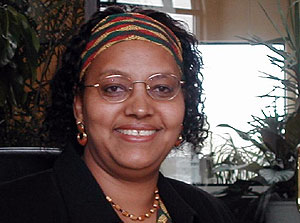|
Audio
Photos
Resources
Your Voice
|
AIDS outreach for Minnesota's African immigrants
May 9, 2003
The infection rate of new HIV AIDS cases in Minnesota has stabilized. But there's a troubling exception to that trend. The infection rate is growing among the state's African-born immigrants. Between 2001 and 2002 new cases jumped 41 percent. In an effort to combat the rise in new cases, the Minnesota Department of Health has launched a special outreach program aimed at African immigrants.
Minneapolis, Minn. — It's an early spring day. Elizabeth Namarra visits the tiny office of a Somali organization in Minneapolis. She wears a headband with bright stripes of red, yellow and green. Namarra's lilting voice reveals traces of her native Ethiopia. She sits across from the organizations director and gets down to business.
"My job is meeting with African community leader and organizations to talk about HIV prevention," she explains.
Then Namarra begins talking about what she considers the largest obstacles to HIV education in the African community --- religion and stigma. Many in the African- born community are very religious. They say some people are pre-destined for AIDS infection. It's Namarra's job as an HIV outreach coordinator with the state health department to explain that the disease is preventable.
 | |||
So she asks Somali leader Mohammed Rashid some questions.
"In the past I talk to a lot of Somali people they say that Allah created AIDS to punish people that are not obeying him. So he punishes them with this disease," she says. "How can you eliminate misconception to provide facts about HIV?"
Mohammed Rashid pauses briefly. He's been through a course on AIDS and HIV sponsored by the Red Cross and says he learned a lot about how the disease is transmitted. Rashid is also deeply religious. He tries to explain AIDS from both points of view.
"Well, everything good is from God. We believe everything is from God. If you get sick it's from God but you have to prevent it," says Rashid.
 | |||
Health officials like Elizabeth Namarra say education is vital, not only for prevention, but also to help care for those who are infected. People identified as HIV positive are often shunned by the community -- even by their own families. Such is the stigma no recent African immigrant with the disease was willing to talk with Minnesota Public Radio, even off the record.
Namarra says she has to be sensitive to these concerns. She says she always chooses her words carefully when she's talking to community leaders. Some words like "sex" she avoids entirely. As a result Namarra's developed a kind of culturally sensitive curriculum that she hopes brings home the message with being offensive.
Minnesota is the first state in the country to separate HIV cases involving African Americans from African-born immigrants. The statistics are grim. For the past five years the new infection rate has steadily grown. Between 2001 and 2002 HIV cases among African immigrants jumped more than 40 percent. The Immigration and Naturalization Service screens prospective immigrants for HIV and AIDS. As a result health officials believe most of these infections occurred in the U.S.
Tracy Sides is an epidemiologist at the Minnesota Department of Health. She focuses on HIV and AIDS. Sides says she hopes AIDS education and outreach can slow the infection rate amongst African immigrants.
"These are folks that have moved here that have not been exposed to 20 years of prevention messages," she says. "Minnesota and the rest of the nation really have. So we really have a long way to go in terms of awareness and education about the disease that is a significant barrier and can only be really effectivly dealt with in the communities."
While Minnesota's the first state to focus attention the plight of African immigrants, health officials say there are similar situations across the country.
|
News Headlines
|
Related Subjects
|

